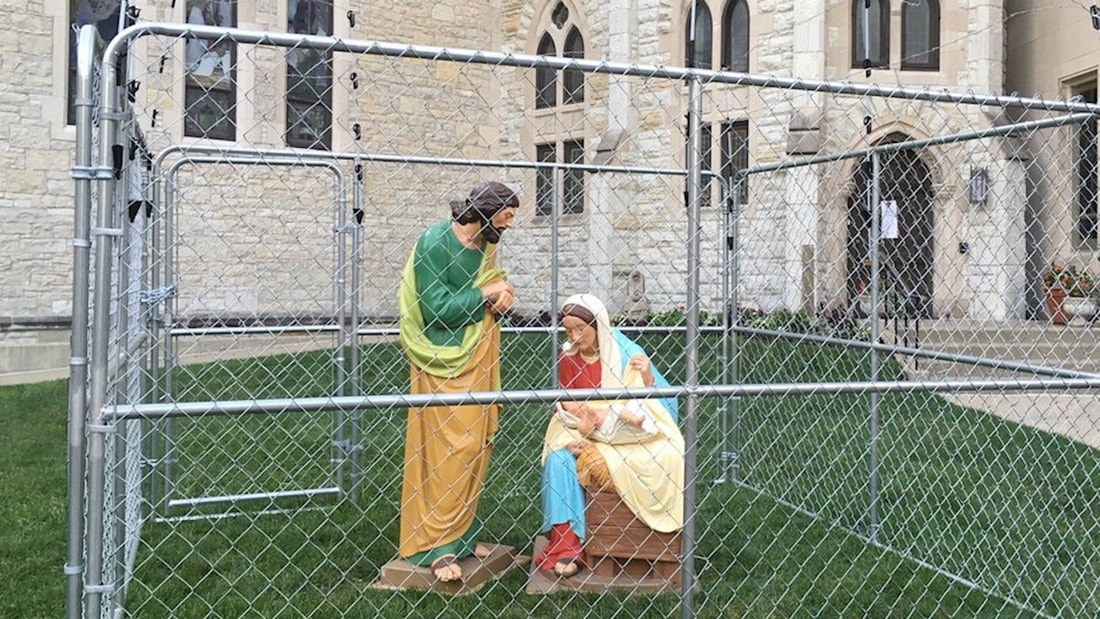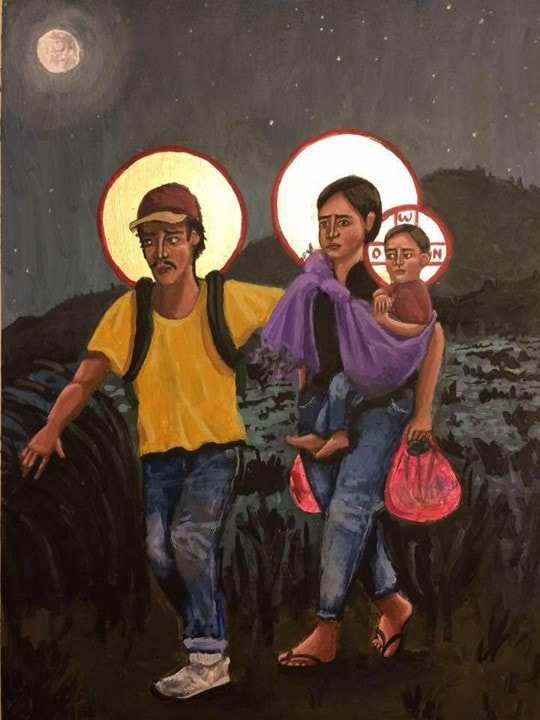Scott Anderson2 Samuel 7:1-11, 16 † Luke 1:46b-55 † Romans 16:25-27 † Luke 1:26-38
A video version of this sermon can be found here. Would it surprise you to know that this story from Second Samuel, this story of the victorious King David, now settled in his reign, now looking to build a permanent temple for God did not actually come together at a time when “the king was settled in his house and the LORD had given him rest from all his enemies around him”? Would it surprise you to know that it came about much later, during captivity in Babylon, when the temple that David’s son Solomon ultimately built for the LORD lay in ruins along with much of the civilization Israel had known at its peak, when the best and the brightest and the most privileged of Israel’s citizens had been forced to resettle as refugees in a foreign land? Would it surprise you to know that it came about when there was no rest, no house, and no king?[i] Perhaps it doesn’t surprise you. Perhaps it surprises you no more than knowing the story of Mary and the angel Gabriel was written down a full generation or two later, at a time when this one whose birth is foretold, this Jesus the Messiah had been executed as an enemy of the state and the church, and this miraculous child John, of the eighty-something year-old Elizabeth, had been beheaded, and when the very structure of Jewish life that serves as the backdrop to this story had been undercut, when there was once again no rest, no house, and no king. What is it about this hope of ours, that it seems to thrive when things are unfinished, that it seems to flourish most in trouble, in suffering, and in need? What is it about this mysterious faith of ours, that it is strongest, according to Romans, when revealed after long ages of being kept secret? What is it about this love of ours, that it is made perfect in weakness?
0 Comments
Scott AndersonIsaiah 64:1-9 † Psalm 80:1-7, 17-19 † 1 Corinthians 1:3-9 † Mark 13:24-37
A video version of this sermon can be found here. There is no less light in the world. I understand this may be difficult for us to imagine on these days in our Pacific Northwest when light seems to be such a scarce commodity. The comments began soon after we said goodbye to Daylight Saving Time and gave ourselves that extra hour of sleep—a brief reward for the inundation of darkness that now affords us only 8 hours and change of this dripping, gray miasma we now call daylight. If you’re among the small group who still commute farther than from your bedroom to your, I don’t know, bedroom, you probably go to work and come home in this blanket of darkness. It can be overwhelming. Especially so this year. But, unless you believe in a flat earth, and the heavens as some kind of a literal canopy above it, we know this is simply a matter of perspective. There is no less light in the world. We are simply spending more time in the shadows these days as our earth has begun that part of its travels around the sun that radiates more energy and light on the southern hemisphere than the northern. It’s a matter of perspective. The sun shines just as bright. The light is there, along with the dark. It always is. It’s just that we don’t get the same angle on it that we do in those July days when the light lasts for 16 hours and the darkness is almost non-existent to those of us who go to bed by 10 or wake up after 5. Scott AndersonIsaiah 9:2-6 † Hebrews 1:1-3a, 5-12 † Luke 2:1-20 It is not a secret, this story. It’s no mystery either under these stars, in this realm, in this moment. The simple truth of this night is that steadfast love is what holds us. Steadfast love is what promises a future in even the most uncertain times. Steadfast love is what turns any crisis, any unstable and dangerous instant into possibility and promise and salvation. This is not to say that suffering and death suddenly cease. It is not to say that tyrants have not and do not control more than they should. If anything, it anticipates that instability, suffering, and danger ramp up. This too, is surely obvious to any who care to pay attention to what happens to those who receive the shorthand designation “the least of these” in any given time.
Scott Anderson1 Sam. 2:18-20, 26; † Ps.148; † Col.3:12-17; † Luke 2:41-52
So tell me if this sounds familiar: “O daughter, you are blessed by the Most High God above all other women on earth; and blessed be the Lord God, who created the heavens and the earth, who has guided you…” Let me stop right there to ask you: Is it familiar? It sounds like Elizabeth, bursting out in song when Mary shows up at her doorstep, doesn’t it? “Blessed are you among women, and blessed is the fruit of your womb. And why has this happened to me, that the mother of my Lord comes to me?” It sounds like a song for Mary, mother of Jesus, for gentle Mary, meek and mild. But, as you may have guessed, this isn’t that. It’s actually a quote from the book of Judith, which you and I both know is not in our Bible, that is, not in the Protestant canon. But it is in the Septuagint, which is the early Greek translation of the Hebrew Bible or Old Testament that Jesus would have known. It is also in the Catholic and Eastern Orthodox canons. So I think we can talk about her, and some of the other women who were, like Mary, highly favored. Maggie BreenZephaniah 3:14-20 † Isaiah 12:2-6 † Philippians 4:4-7 † Luke 3:7-18
Well that was quite a turn wasn’t it. From the smooth certain assurances of the psalm: “Surely, it is God who saves me; I will trust and not be afraid. For the Lord is my stronghold and my sure defense, and God will be my Savior.” And from the bright jubilation of Zephaniah: “Sing aloud, O daughter Zion; shout, O Israel! Rejoice and exult with all your heart, O daughter Jerusalem! The Lord has taken away the judgements against you, he has turned away your enemies. The king of Israel, the Lord, is in your midst; you shall fear disaster no more.” And from the lovely appeal for gentleness and patient prayer in Philippians: “Rejoice in the Lord always; again I will say, Rejoice. Let your gentleness be known to everyone. The Lord is near. Do not worry about anything, but in everything by prayer and supplication with thanksgiving let your requests be made known to God.” From all of that to John: “You brood of vipers – who told you to flee from the time to come…..His winnowing-fork is in his hand, to clear his threshing-floor and to gather the wheat into his granary; but the chaff he will burn with unquenchable fire.’” Scott AndersonMalachi 3:1-4 † Luke 1:68-79 † Philippians 1:3-11 † Luke 3:1-6
Righteousness. It’s right there in that first reading, this big word in our faith, but it is there all over the place in the readings, this word that, I suspect for some of us, has lost a bit of its luster. It may be due for a shining, a brightening up, so we can see it again for what it says and for what we hope, and for who we are. God will refine them, purify them until they present offerings to the Lord in righteousness, Malachi imagines. The writer to the Philippian church echoes this sense of the power of God through the practicing of this good news to sharpen and purify those who follow this way through generosity and largeness of heart. This is, in effect, Isaiah’s making straight the way for God’s return that John the Baptist cries out for in the wilderness, for the things that make for peace and goodness, for much of what we may notice to be missing these days. The ritual around the funeral of our 41st president, George H. W. Bush this past week highlighted for me some of these things for which we long. Perhaps for you too—the remembering of a time and a way of being connected to others that seems in short supply these days. Scott Anderson 2 Samuel 7:1-11, 16 † Psalm 89:1-4, 19-26 † Romans 16:25-27 † Luke 1:26-38
Would it surprise you to know that this story from Second Samuel, this story of the victorious King David, now settled in his reign, now looking to build a permanent temple for God, would it surprise you to know this passage did not actually come together at a time when “the king was settled in his house and the LORD had given him rest from all his enemies around him”? Would it surprise you to know that it came about much, much later, during captivity in Babylon, when the temple that David’s son Solomon ultimately built for the LORD lay in ruins along with much of the civilization Israel had known at its peak, when the best and the brightest and the most privileged of Israel’s citizens had been forced to resettle as refugees in a foreign land? Would it surprise you to know that it came about when there was no rest, no house, and no king?[i] Perhaps it doesn’t surprise you. Perhaps it surprises you no more than knowing the story of Mary and the angel Gabriel was written a full generation or two later at a time when this one whose birth is foretold, this Jesus the Messiah had been crucified on a wooden cross as an enemy of the state and a criminal, and this miraculous child John, of the octogenarian Elizabeth, had been beheaded, when the very structure of Jewish life that serves as the backdrop to this story had been undercut, when there was once again no rest, no house, and no king. What is it about this hope of ours, that it seems to thrive when things are unfinished, that it seems to thrive most in difficulty, in suffering, and in need? What is it about this faith of ours, that it is strongest, according to Romans, when disclosed after long ages of being kept secret? What is it about this love of ours, that it is made perfect in weakness? Maggie Breen Isaiah 61:1-4, 8-11; Luke 1:47-55; 1 Thessalonians 5:16-24; John 1:6-8, 19-28
I have heard it said, and I have also said myself, that movement towards justice and peace takes time. In times of discouragement and doubt, I have gone to those I trust, I have come to this place on a Sunday, and I have asked how to hang on. I have been encouraged to try to do so, as best I can, by trusting that in small actions of love and in steady movement to the side of those who are vulnerable and excluded, we not only get powerful glimpses of love and hope in the moment, but get a sense that we connected to something bigger than ourselves, a power that is good and faithful, that gives life meaning and that moves the arc of the moral universe towards justice. There have been a trail of Mary’s in the path of this arc. They have shown up in their own vulnerabilities, shown up on behalf of those who suffer and those who do not have equal control over their lives, or full access to the opportunities that others are afforded. A trail of Mary’s who hoped, I imagine, that maybe in the moment, their contribution would be the one to topple in some decisive way the systems that oppressed them and others, but who ultimately had to trust that the justice and sense of hope that propelled them would come in a larger way in the future, a future illuminated in important parts of their own lives for sure, but also bigger than who they were and what they could fully know. Mary, the mother of Jesus was in a line of Mary’s who’s heart sang, and whose heart pined for the world to turn. Scott Anderson Isaiah 64:1-9 † Psalm 80:1-7, 17-19 † 1 Corinthians 1:3-9 † Mark 13:24-37
There is no less light in the world. I understand this may be difficult for us to imagine on these days in our Pacific Northwest when light seems to be such a scarce commodity. The comments began soon after we said goodbye to Daylight Saving Time and gave ourselves that extra hour of sleep—a brief reward for the inundation of darkness that now affords us only 8 hours and change of this dripping, gray miasma we now call daylight. If you commute, you probably go to work and come home in this blanket of darkness. The same is true for school. It can be overwhelming. Especially so, perhaps, this year. But, unless you believe in a flat earth, and the heavens as some kind of a literal canopy above it, we know this is simply a matter of perspective. There is no less light in the world. We are simply spending more time in the shadows these days as our earth has begun that part of its travels around the sun that radiates more energy and light on the southern hemisphere than the northern. It’s a matter of perspective. The sun shines just as bright. The light is there, along with the dark. It always is. It’s just that we don’t get the same angle on it that we do in those July days when the light lasts for 16 hours and the darkness is almost non-existent to those of us who go to bed by ten or wake up after five. It’s a matter of perspective, and timing, this relationship we have to darkness of all sorts. There is this tension in us, we creatures who live on this fragile earth. Call it circadian if you wish. We are circadian Cascadians, you and I. We are defined and limited and bounded in time and space. We oscillate between wanting to tear down and wanting to construct. Sometimes the first is necessary in order to do the second. Sometimes that destructive voice is just the first voice—the voice of pain and isolation and vulnerability that wants to tear open the heavens and let the light shine through the darkness, that wants the earth to shake so someone else might feel what you feel, that wants others to taste the tears that have been your bread for so many nights under these stars. Parker Palmer captures this insight, I think, when he suggests that violence “is what we get when we do not know what else to do with our suffering.” So Mark imagines what Isaiah craves: The stars begin to fall when God tears through the fabric of the heavens to come down to earth to fix everything. Wouldn’t that be some good news! All the abusive and opportunistic powers of the world, all the lesser lights give way to the one true light, the one true power, the one true Love that can fix all that is broken. Julie Kae SigarsIsaiah 35:1-10 • Psalm 146:5-10 • James 5:7-10 • Matthew 11:2-11
Hallelujah. It was a strange quarter. Beginning as all quarters do: hopeful…This time, I will keep up with my grading. This time, I will give extra time to my students. This time…this time…Fresh starts are hopeful times…. It was an odd class. Not really, all classes have their quirks. And frankly, my classes are known for being welcoming for the quirky. But this particular class, Song of the Church (yes, really) started out with barely enough students to make the class continue, and then kept adding students as the first two weeks went along. Each had their stories. And several had the need to state them right up front. “I was raised in the church…not sure about all of this God stuff now….DON’T JUDGE ME.” She actually said this as if it was all capital letters. This young woman also used to sing, but she lost her voice. I remember smiling and saying, welcome. You are in the right class. “I was raised in the church. [notice the pattern?] And I do not attend now. I think the church thinks they have all the right answers. I think the church pretends to be loving when it really isn’t. The church….the church….Don’t judge me….” but this was a soft, lower case letters plea. |
St. Andrew SermonsCategories
All
|



 RSS Feed
RSS Feed